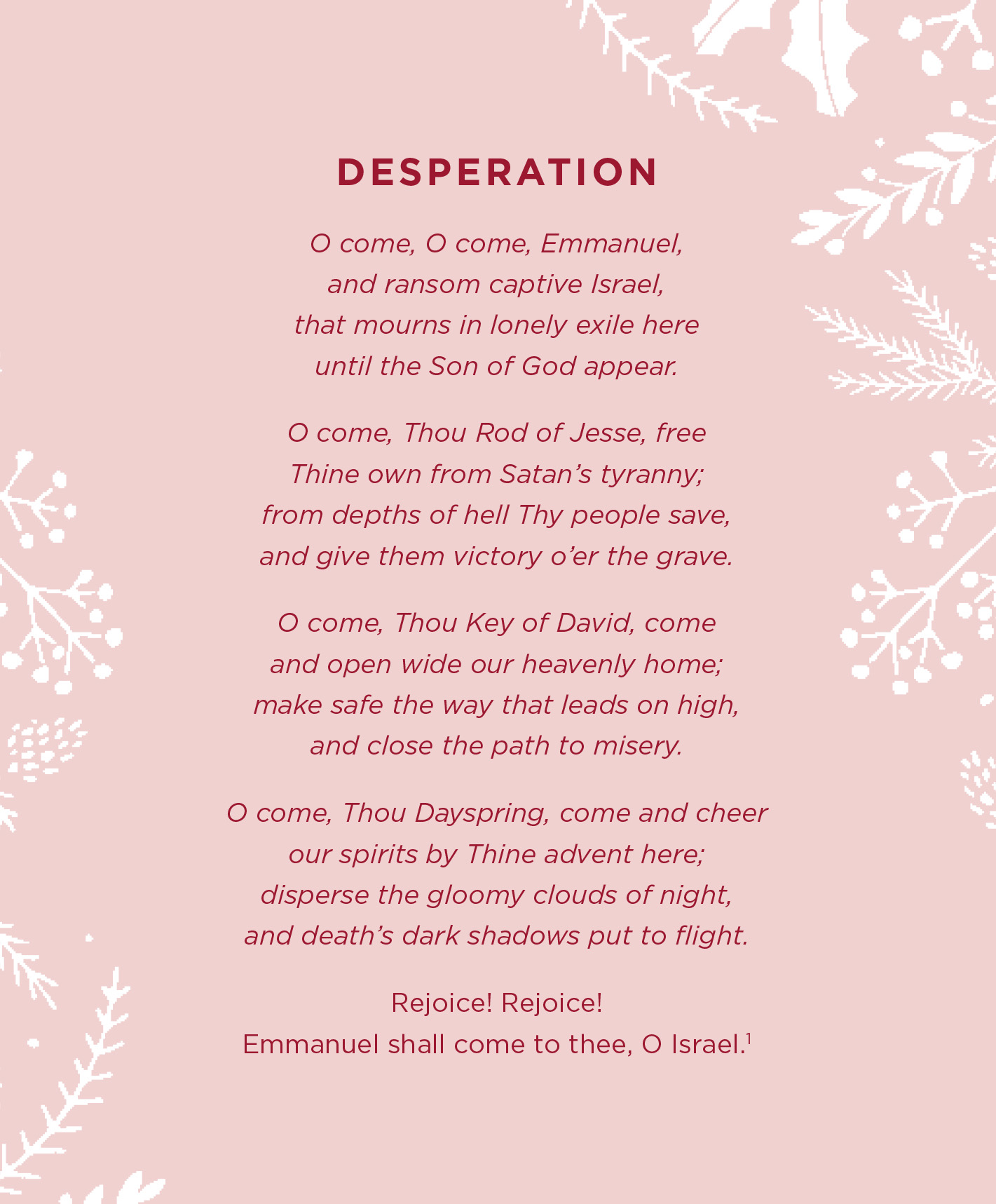Born a Child and Yet a King預覽


Day 4: Out of Nowhere
The traditional tune of “O Come, O Come, Emmanuel” is set in a minor key, giving it a melancholy sound and prompting our singing to be slow and somber in tone. But there comes a triumphal point in the song where it seems appropriate to pick up the tempo a bit. And here it is:
O come, Thou Rod of Jesse, free Thine own from Satan’s tyranny; from depths of hell Thy people save, and give them victory o’er the grave.
Freedom, salvation, and victory over death, hell, and the grave—that’s the ending we’re all counting on, right? We yearn for the assurance that Christ will at last “destroy the one who has the power of death, that is, the devil,” delivering us from our greatest lifelong fear (Heb. 2:14–15).
Armed with such a deep, prayerful desire for the defeat of our own worst enemy, we can understand why the Jews throughout biblical history, whether they were being oppressed by the Egyptians, the Babylonians, the Romans, or whomever, longed for a warrior Messiah who would “strike the earth with the rod of his mouth” (Isa. 11:4). The deliverance they sought from their enemy was tied to the arrival of One who would bring down the “rod” of justice with the force of divine retribution, ending the reign of evil.
They truly believed it would happen.
They just didn’t believe it could come from the “Rod of Jesse.”
That’s because the word rod, translated in the King James rendering of Isaiah 11:1 and echoed in the carol—“a rod out of the stem of Jesse”—is a different Hebrew word than the one used to “strike the earth” just three verses later. The word in verse 1 is more accurately translated as a small branch, a shoot, a tiny twig. And Isaiah, by connecting this “rod” imagery to Jesse—a common man who, despite being the father of David, was himself born in obscurity, not royalty or nobility—only reinforced the humble nature of this descendant of Jesse, who would be born many generations later.
But herein lies the gospel in carol form, proclaimed through an Old Testament prophet seven hundred years before Christ’s appearing. At the end of the previous chapter (Isaiah 10), he had referred to Israel’s enemies as a tall, lofty forest of thick-rooted trees. And yet this One who would grow up “like a tender shoot” (Isa. 53:2 NIV)—a vulnerable and unlikely warrior—would ultimately triumph over the most towering enemies in our lives:
• the “tyranny” of Satan
• the tormenting “depths of hell”
• the haunting finality of “the grave”
Isaiah 10 depicts this triumph dramatically:
Behold, the Lord God of hosts
will lop the boughs with terrifying power;
the great in height will be hewn down,
and the lofty will be brought low. (v. 33)
Indeed, this tiny infant whose birth we celebrate at Christmas will one day be “revealed from heaven with his mighty angels in flaming fire” (2 Thess. 1:7–8). From apparent weakness to consuming power—I dare you to sing that message in somber tones.
Prayer
Lord, You consistently surprise us with the ironies of Your ways. You teach us to find our lives by losing them and seek our greatness by becoming servants. Naturally, then, we shouldn’t always expect You to seem more powerful than our enemies, only to be more powerful. Help us realize today, when we feel outmatched, that You are bigger than whatever feels too big for us.
Keep Reading
Psalm 89:20–24
“The enemy shall not outwit him.” (v. 22)
Isaiah 11:1–10
“The Spirit of the Lord shall rest upon him.” (v. 2)
Revelation 5:1–5
“The Root of David . . . has conquered.” (v. 5)
Consider
What difference does considering Christ’s victory over fear make for you? How does it help you know that His dominance over all enemies is already assured, even when you cannot see it?








